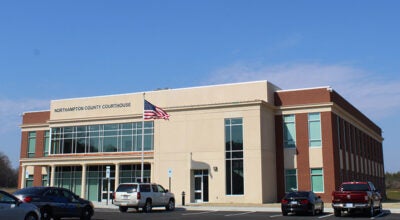Rate hike proposed
Published 5:44 pm Sunday, March 10, 2019
(Editor’s Note: This story has been updated from its original posting to include revisions made by the Carolina Public Press.)
By NEILL CALDWELL
Carolina Public Press
A proposed 19 percent increase in mobile home insurance premium rates in North Carolina is sending shudders through the state’s poorest citizens and the agencies and groups that serve them.
“I just pray,” Joyce Patton said.
Prayers are all the insurance that the McDowell County resident can afford on her mobile home right now, even without the proposed premium increases.
Rising rates caused Patton, a widowed grandmother raising two teenage grandchildren, one of whom has Down syndrome and is autistic, to drop her homeowner’s coverage. When there’s news of a strong storm on the way, she puts her trust in her faith to protect her home and family.
Patton lives near Nebo in McDowell County, one of the North Carolina counties with a high percentage of its population living in mobile or manufactured homes, at 31 percent, according to the U.S. Census Bureau.
Any additional increase in insurance prices would be “terrible,” Patton said.
But the N.C. Rate Bureau recently applied for a 19 percent increase in premiums for homeowner casualty policies and 19.9 percent for home fire policies.
The proposed rate increases are subject to approval by the N.C. Department of Insurance, which normally approves a much lower increase than the insurance industry requests. But any increase may force many residents in the state to do without insurance on their residences. That could be most severely felt in counties with large populations residing in mobile homes.
“Such an increase would be a pretty substantial blow (to that population),” said the Rev. Alan Sailors, pastor of Rocky Pass Free Will Baptist Church, where Patton is a member.
The church offers a number of ministries, including provision of heating oil to folks who need it in the winter.
“The reason they’re in a mobile home is mostly because of their financial situation,” Sailors said. “Most are older folks on fixed incomes or really young folks just starting out. They struggle week to week and month to month.”
While the economy in McDowell has slightly improved, most jobs are low-wage, according to the pastor.
“We’re a poor little county,” Sailors said. “There’s only one major employer here. There are just a lot of needs. I wish we could do more. We try to link up with other ministries and local government agencies. The county’s (Department of) Social Services is overwhelmed.”
“When my husband was living, we had insurance,” Patton said. “But we had two incomes. The insurance went up enough that we couldn’t pay it, so we just had to do without. If it goes up any more, a lot of people will have to say, ‘I don’t have insurance.’”
The Rate Bureau has recently asked for increases for several types of homes. Responding to a request for an increase for general homeowners insurance, state Insurance Commissioner Mike Causey called the proposed rate hike “excessive and unfairly discriminatory.”
When contacted about the requested increase for mobile homes, Causey took a softer tone.
“We are in the early stages of reviewing this rate request,” he said. “But once the numbers are analyzed and I review the public comments, I’ll be able to make a decision to determine if this increase is needed. My goal as commissioner is to ensure consumers get the best rate possible and that the (insurance) industry remains robust.”
Robeson County leads the state in population living in mobile homes, with 38.6 percent. One in three Robeson County residents are considered to be living in poverty, compared with 17.2 percent of the state population, according to the Census Bureau’s Small Area Income and Poverty Estimates, which were released in December.
The number of children living in poverty is even higher, at 46 percent.
Robeson County is also last among North Carolina counties in median household income at $29,965 and is last out of 100 North Carolina counties in health outcomes. It is regularly listed among the poorest counties in the entire nation.
“I know families who live in mobile homes are some of the poorest families in our county,” said Dr. Jessica Lowery Clark, executive director of the Robeson County Partnership for Children in Lumberton.
“Such a (insurance premium) rate increase could potentially require a family to not have their mobile home insured,” she added. “We encourage sustainability for all families in our community, particularly low- or fixed-income families. I hope the insurance industry will consider the average income level of families living in mobile homes before increasing the rate by 19 percent. Hopefully, there is another solution.”
Bertie County in the northeastern part of the state is another of North Carolina’s poorest counties, 88th out of 100 in health outcomes, a median household income that’s half the national average and close behind Robeson in terms of the number of people living in mobile homes, with 36.5 percent.
Bertie is also home to seven of North Carolina’s top 10 towns with the biggest percentage decline in residents, according to the UNC Carolina Population Center.
“Such an increase would be very detrimental to our population based on the local economy,” said Bertie County Director of Social Services Cindy Perry. “I would say the majority of people in Bertie could not afford that level of insurance because they are already on a fixed income. For many folks, especially the elderly population, it would be choosing to buy medicine or paying for insurance.”
Mobile homes are also abundant for others living in northeastern North Carolina. Gates County has 30.4 percent of its residents residing in mobile homes; Hertford County has 23.8% and Northampton has 21.7%.
If approved, any rate increase would go into effect on Feb. 1, 2020. Commissioner Causey has not set a date for a required public hearing on the proposed increase.
The public will have an opportunity to comment on the proposal in addition to the public hearing in the fall. There are two ways to provide public comment:
Emailed public comments should be sent by March 20 to 2019MH@ncdoi.gov.
Written public comments can be mailed to Mary Sanders, Administrative Specialist, 1201 Mail Service Center, Raleigh, NC 27699-1201, also by March 20.
Neill Caldwell is a contributing writer to Carolina Public Press. Email him at neillcaldwell@gmail.com.



